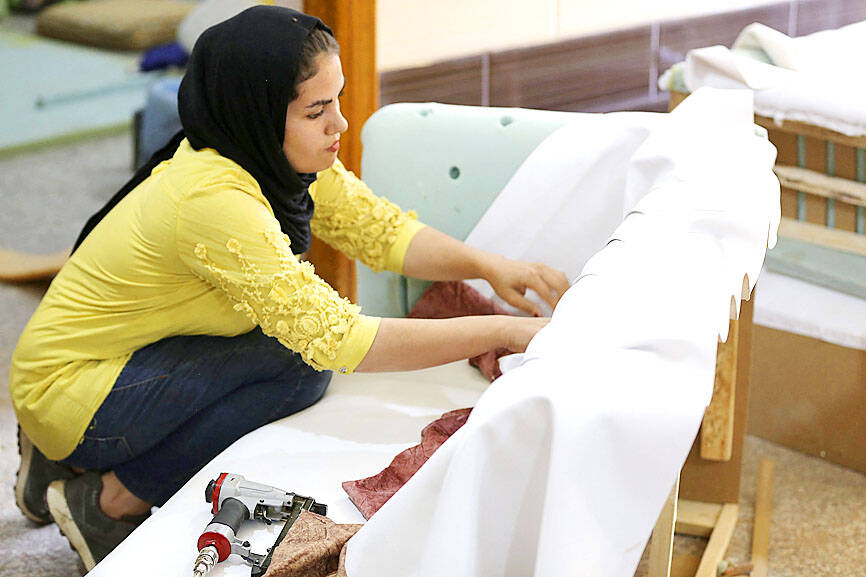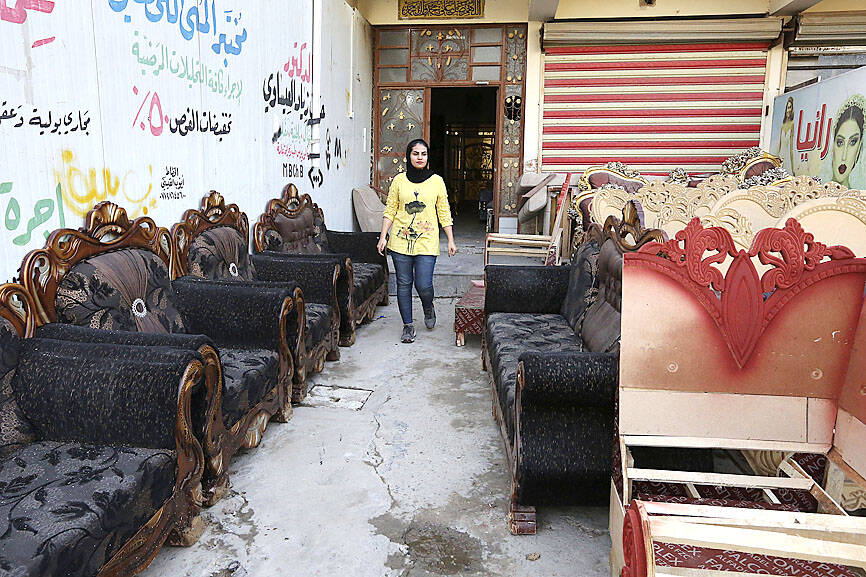With hammer and saw, Nour al-Janabi builds her latest creation, a candy-pink sofa, in the carpentry workshop she runs in male-dominated and conservative Iraq.
“At the start, relatives criticized me,” said the 29-year-old carpenter and furniture-maker, who is also a mother of four. “They would say: ‘But you’re a woman... You’re an amateur... It’s a men’s trade.’”
Covered in velvet or imitation leather, the sofas and armchairs that she designs, makes and mends in her south Baghdad workshop go from rustic style to Louis XV.

Photo: AFP
Her order book is full, with new lounges starting at a cool 700,000 dinars (US$479.29).
Al-Janabi has been making furniture for several years, and launched her business, Nour Carpentry, a few months ago. She recently moved operations from her home to a house turned workshop, where she has four employees — one of whom is her retired husband.
“But it’s not right to say it like that,” she said with an embarrassed smile, her hijab covering her hair.

Photo: AFP
In oil-rich Iraq, women make up just 13.3 percent of the labor force, World Bank data showed, while the World Economic Forum ranked the country 154 out of 156 in its latest Global Gender Gap Report.
A study published last year by two UN agencies said that while most Iraqis consider tertiary education equally important for men and women, “attitudes toward equal rights in employment are discriminatory against women.”
Al-Janabi attributes her success largely to do-it-yourself tutorials that she first posted on Facebook to share her passion for carpentry and furniture-making.
She uploads videos — about everything from how to re-stuff an old sofa to using a sander — to TikTok and Instagram, where she has more than 94,000 followers.
“I am the first Iraqi woman to do this trade and break the barrier in this field,” she said, in a country still largely dominated by conservative attitudes about women’s role in society, and where those perceived as too independent are sometimes even considered immoral.
She said she receives comments from women and men telling her: “You make Iraq proud and you have accomplished something.”
“May God give you strength and health,” one user commented on a video of al-Janabi presenting a sofa decorated with a floral pattern.
One of her clients, Abu Sajjad, dropped by to see how his sofa repairs were going — untroubled by prejudices some others might harbor against dealing with a female carpenter and business owner.
Most working women in Iraq are teachers or nurses, although a small number have entered the police or armed forces.
One of them is Angham al-Tamimi, who this year became the first female army general.
In a video broadcast by the military’s news service, she said she had “faced the nonacceptance of women in the military.”
However, she said she had succeeded thanks to her “persistence” and “passion.”

Nvidia Corp chief executive officer Jensen Huang (黃仁勳) on Monday introduced the company’s latest supercomputer platform, featuring six new chips made by Taiwan Semiconductor Manufacturing Co (TSMC, 台積電), saying that it is now “in full production.” “If Vera Rubin is going to be in time for this year, it must be in production by now, and so, today I can tell you that Vera Rubin is in full production,” Huang said during his keynote speech at CES in Las Vegas. The rollout of six concurrent chips for Vera Rubin — the company’s next-generation artificial intelligence (AI) computing platform — marks a strategic

REVENUE PERFORMANCE: Cloud and network products, and electronic components saw strong increases, while smart consumer electronics and computing products fell Hon Hai Precision Industry Co (鴻海精密) yesterday posted 26.51 percent quarterly growth in revenue for last quarter to NT$2.6 trillion (US$82.44 billion), the strongest on record for the period and above expectations, but the company forecast a slight revenue dip this quarter due to seasonal factors. On an annual basis, revenue last quarter grew 22.07 percent, the company said. Analysts on average estimated about NT$2.4 trillion increase. Hon Hai, which assembles servers for Nvidia Corp and iPhones for Apple Inc, is expanding its capacity in the US, adding artificial intelligence (AI) server production in Wisconsin and Texas, where it operates established campuses. This

Garment maker Makalot Industrial Co (聚陽) yesterday reported lower-than-expected fourth-quarter revenue of NT$7.93 billion (US$251.44 million), down 9.48 percent from NT$8.76 billion a year earlier. On a quarterly basis, revenue fell 10.83 percent from NT$8.89 billion, company data showed. The figure was also lower than market expectations of NT$8.05 billion, according to data compiled by Yuanta Securities Investment and Consulting Co (元大投顧), which had projected NT$8.22 billion. Makalot’s revenue this quarter would likely increase by a mid-teens percentage as the industry is entering its high season, Yuanta said. Overall, Makalot’s revenue last year totaled NT$34.43 billion, down 3.08 percent from its record NT$35.52

PRECEDENTED TIMES: In news that surely does not shock, AI and tech exports drove a banner for exports last year as Taiwan’s economic growth experienced a flood tide Taiwan’s exports delivered a blockbuster finish to last year with last month’s shipments rising at the second-highest pace on record as demand for artificial intelligence (AI) hardware and advanced computing remained strong, the Ministry of Finance said yesterday. Exports surged 43.4 percent from a year earlier to US$62.48 billion last month, extending growth to 26 consecutive months. Imports climbed 14.9 percent to US$43.04 billion, the second-highest monthly level historically, resulting in a trade surplus of US$19.43 billion — more than double that of the year before. Department of Statistics Director-General Beatrice Tsai (蔡美娜) described the performance as “surprisingly outstanding,” forecasting export growth